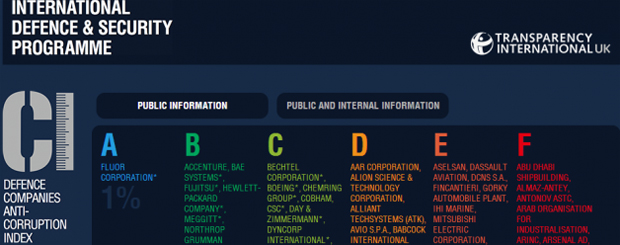This text was originally posted in Transparency International UK’s blog.
This week’s revelations in the Sunday Times show that it is very difficult for BAE Systems to escape from the long-standing allegations of corruption, despite the court settlement of $450 million (£30 million in the UK, the rest in the US) two years ago for books and records offences. A BAE spokesperson confined herself to noting that “The fact is the company has never been charged with or convicted of any offence involving corruption or the making of illegal payments in relation to these or any other matters.”
What do these new allegations, concerning £6 million of property in Mayfair apparently owned by BAE’s former CEO & Chairman, Dick Evans, tell us?
First, that we still do not know the truth about BAE’s dealings with the Saudi government and others. The settlement between the SFO and BAE was negotiated behind closed doors. In the UK, the sentencing judge, Mr Justice Bean, expressed surprise at the terms agreed by the SFO in a settlement agreement that he described as “loosely and perhaps hastily drafted”. He said that he was “surprised to find a prosecutor granting a blanket indemnity for all offences committed in the past whether disclosed or otherwise.” TI shared the Judge’s concern at the time and has not changed its view.
Secondly, these new allegations remind us that not a single individual has apparently been held accountable. If the $450 million in fines were genuinely for books and records offences, then one may assume that the company had some very bad book-keepers. The CEO is book-keeper in chief. Yet if the allegations are true, he was not punished, but rewarded. Given the current debate about clawbacks from executives who have deceived or under-performed, it is legitimate to ask whether BAE has properly investigated the actions of its most senior executives and whether they received improper benefits.
Thirdly, it raises questions about the durability of the improvements that were stimulated by the Woolf Report, which was commissioned by BAE to set itself on a path of improvement. Controversially even at the time, the Woolf Committee’s terms of reference were to look at BAE’s future and not its past. However, as more and more evidence and allegations have emerged about BAE’s past practices, it begs the question of whether BAE’s past dealings have really been properly investigated.
In a recent Index published by TI, the evidence actually suggested that BAE now has a good level of basic anti-corruption systems in place. But in keeping with this evidence of progress, the company should be completely transparent about its past dealings. This will be a key step in restoring trust from the public (whose taxes pay for much of the company’s sales), government, and employees. Has BAE demonstrated a true commitment to pursuing ethical business practices that are free from corruption? TI believes that unless a company genuinely faces up to its past then any remediation it tries to put in place is far less likely to succeed. This is important, because BAE is an important UK company. If we are to have a national champion in defence, we should want that company to be a champion for an ethical defence industry, starting with itself.
We may perhaps never know the truth behind this episode. But at least we can learn some lessons from it, especially as the SFO is about to be given a new tool, the Deferred Prosecution Agreement (DPA).
If the law allows for a re-opening of the investigation into Mr Evans’ Mayfair properties, then that should certainly happen. Meanwhile, TI reiterates the 18 recommendations made in its policy paper on corporate settlements, including that:
- There must be transparency about settlements such that citizens can judge whether they have been made in the public interest
- There must be judicial scrutiny independent from the prosecutor’s office
- There should be no immunity from prosecution for individuals or blanket grants of immunity
- The crimes should be properly labelled as corruption.
















 Connect with us on Facebook
Connect with us on Facebook Follow us on Twitter
Follow us on Twitter